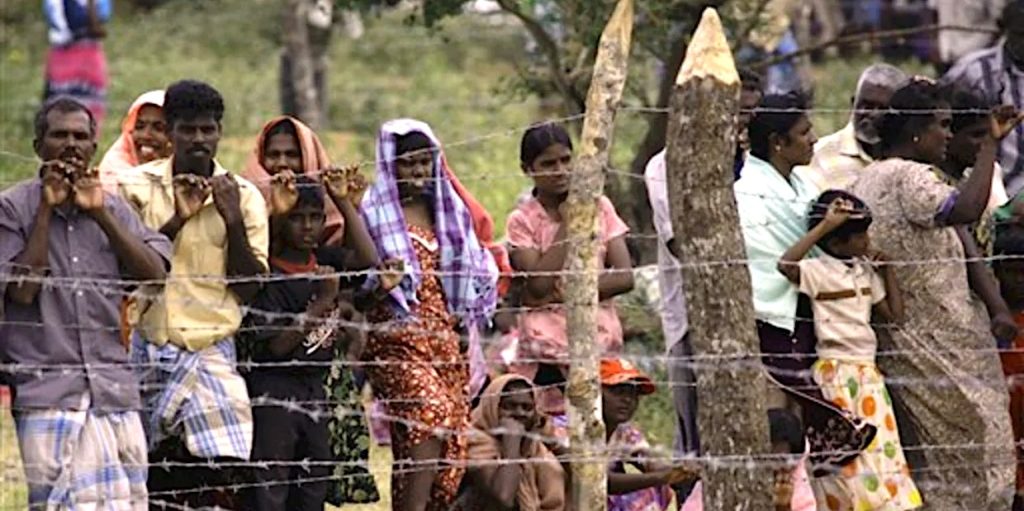Photo courtesy of NBC News
“The need for survival slings a gun on the shoulders of those who search for bread,” writes a Bishop of the Church of Ceylon. In this reflection on his being a witness to slinging the gun, Bishop Duleep de Chickera lyrically propels the reader of his book Beyond Checkpoints into Sri Lanka’s world of societal turbulence.
The brute violence of that social conflict is no longer the direct human experience today in terms of armed conflict, which ended in May 2009 after a whole nation’s physical and mental agony of over a half century. That is, if one is to include the decades preceding the war, of anti-Tamil pogroms and the repeated physical suppression of civic dissent by state security agencies during the linguistic minority protests of the 1950s onwards. This suppression of civic dissent then drove elements of that ethno-linguistic minority to armed struggle beginning with the slaying of Jaffna’s mayor in 1975 by the LTTE.
Churches produce theology. This ecclesiastical scholarship is largely formally intellectual. But sometimes clerics speak at a popular level, fulfilling the need to guide their respective religious adherents. This book is one such expression. This is no reference to religious rabble-rousing whether to incite violence or to build triumphalism and exclusivism.
“Slings a gun” describes the political reality. “Those who search for bread” describes the desperately existential compulsions of individuals and whole social groups. The gun-slingers are the poor and needy whose endeavour is to avoid starvation.
Whatever their religion or philosophy, Sri Lankans appreciate the social fact of economic poverty and consequent inability or difficulty of obtaining food for survival of individuals, families and whole socio-economic classes. In his book, Bishop Duleep starkly throws these facts at the reader.
In his chapter Counting Shells, Bishop Duleep clearly enunciates the spiritual disarray of people ethnically subjugated and subjected to brutal war, including children. Various chapters also refer to the challenge of starvation or at least malnutrition in the chaos of the war zone. His recounting of the emotional discomfort and terror of life in the war zone and of observing this life is vivid and demonstrates his literary skill.
Bishop Duleep evokes emotion through contrasting recollections of actual human experience amid war on the one hand and on the other hand in comfortable conditions outside the war zone.
He observes the normalcy of children in the midst of a war zone in the North as they habitually counted the sound of artillery gun fire by the army. The staccato blasts of a salvo, totally out of control of those being targeted, reminded him of the infinitely more innocuous but equally loud bellowing of ships’ sirens offshore from the college in which he worked, completely disrupting his preaching. That deafening cacophony was also completely beyond his control.
That school is socially well known and the sounds of Southern coastal urbanity are an aspect of metropolitan civilian life. Thus, the part of the nation outside the war zone is thereby emotionally, psychologically and spiritually drawn into the Northern children’s peculiar experience of war. A step further in the peace time aural experience can simply extend to the sounds of church bells, vihara and kovil bells and the call of the muezzin.
This deft matching of similar disruptions as similar occurrences that are normal to their respective contexts imposes on the reader an uncomfortable but authentic recounting, a common historicising, of Sri Lankan life that compels a perhaps undesired but unified experience of starkly different normalcies. We have no choice but to appreciate the children’s experience of deadly shelling at the same time as we learn how ships’ sirens disrupt a school chapel service.
From the pathos of children listening for the shells coming towards them to the peculiar but routine interruption of church worship by ships’ sirens, the reader must make a literary leap of spiritual realisation of experiential commonality and a shared terror.
Bishop Duleep does well to focus fully on the war and its immense societal trauma. The larger trauma of the overall ethnic conflict – a conflict that involves all ethnic communities – can and needs be dealt with in other endeavours and by others. His fine focus helps refine his narrative very sharply and enables a simple lyrical poignancy that seduces in its compelling authority.
Sri Lankan historiography has yet to comprehensively publish for the general public a measured narrative of this post-colonial crisis of the nation-state. Significantly, while there are thousands of academic speciality studies and even small circles of online discussion, the national school curriculum, too, largely excludes such a narrative of the ethnic conflict.
Bishop Duleep’s narrative of the war is a powerful contribution to this literature. Being fully autobiographical, it is a critical reflection from his personal standpoint as a South-based, anglicised and middle class, urban cultural minority person himself. He writes frankly as an outsider to the actual combat zone and the ethnic community so severely devastated by the war.
It is that deliberate and lyrically written juxtaposition of his own existential experience outside with his learnings and experience during his travels inside the war that is his literary and spiritual accomplishment. It is no accident that his full life experience as an Anglican pastor, theologian and Christian community leader during these war years is well manifested in his selection of episodes to memorialise, the political and social themes to draw out and his unambiguously prophetic-critical practise in the recounting.
Beyond Checkpoints is a literary challenge to mundane scholarship, serious public historiography and formal education to fill a yawning gap in our nation’s intellectual life.
